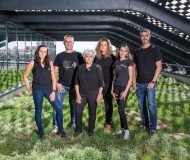

This month of June we celebrated the Day of Transparency in Animal Research, and we want to highlight the Animal Experimentation Service (SEA) of the Sant Pau Research Institute. Coordinated by Dr. Laura Casaní, it is a service dedicated to the maintenance, care, and welfare of laboratory animals, the performance of experimental procedures involving them, and the processing of obtained samples. SEA also organizes surgical skills training.
SEA provides scientific, instrumental, and technical advice and support to different research groups. Furthermore, it ensures compliance with current legislation and advises on meeting the requirements of replacement, reduction, and refinement (3Rs) in the use of animals in experimental procedures. It has a conventional animal facility with the necessary installations to simultaneously house up to 40 pigs, 12 sheep, 114 rabbits, 350 rats, and 2,500 mice under conventional conditions. It also has working rooms for rodents and rabbits, as well as four experimental operating rooms for pigs and sheep. SEA has the SPF Biomodule, an isolated barrier area where up to 384 immunocompromised mice can be housed. Surgical skills training is also organized for healthcare personnel at SEA.
Lidia Puertas, a predoctoral researcher from the Research Group on Regulatory Mechanisms of Cardiovascular Remodeling and a member of CIBERCV, is studying new therapeutic strategies for abdominal aortic aneurysm, a degenerative vascular disease that affects around 8% of men over 65 years old and is associated with high mortality. Currently, there are no pharmacological treatments available to slow down its development.
As a user of the service, Lidia explains, “In addition to studying the molecular mechanisms that occur in patients with aneurysm, we also use a murine model that reproduces some aspects of the human pathology in order to test various drugs and monitor aortic diameter using ultrasound.” These mice are housed at SEA, and the necessary equipment is available for conducting the studies.
On the other hand, Dr. Lorena Alba-Castellon, a researcher from the Oncogenesis and Antitumor Drug group led by Dr. Ramon Mangues, uses SEA to study the in vivo effect of antitumor nanoparticles developed in the laboratory.
“We have developed a nanoparticle that targets the tumor microenvironment, specifically active tumor fibroblasts. Our hypothesis is that by eliminating these fibroblasts, there will be structural and signaling changes between different cell types in the tumor, resulting in a less aggressive tumor phenotype. Since our working hypothesis encompasses multiple components of the tumor, it is difficult to study it in vitro, and this is where we need the animal experimentation service. It allows us to develop mouse models of cancer to work with and confirm or reject our hypothesis.”
What this researcher values most about SEA are the professionals who work there, “always willing to advise and share knowledge.”
Biomedical institutions worldwide share their stories and experiences with the public, and this year, the Sant Pau Research Institute has joined the #BOARD23 campaign by EARA by producing a series of videos that explain how their Experimental Animal Service (SEA) works and focus on the people involved in the platform.
SEA is the area dedicated to the maintenance, care, and welfare of laboratory animals, as well as working with experimental procedures and processing obtained samples. But what services does it offer? How does it comply with the 3Rs? Let’s discover it.
As users of the Experimental Animal Services, researchers Lidia Puertas and Eduard Gallardo explain why using murine models is important for their research and how SEA complies with the 3Rs.
For the Sant Pau Research Institute, animal welfare is very important. Sergi Florit, Manager of Animal Research Facilities, states that “By law, we observe and evaluate the general condition of the animals housed through daily supervision 365 days a year.”